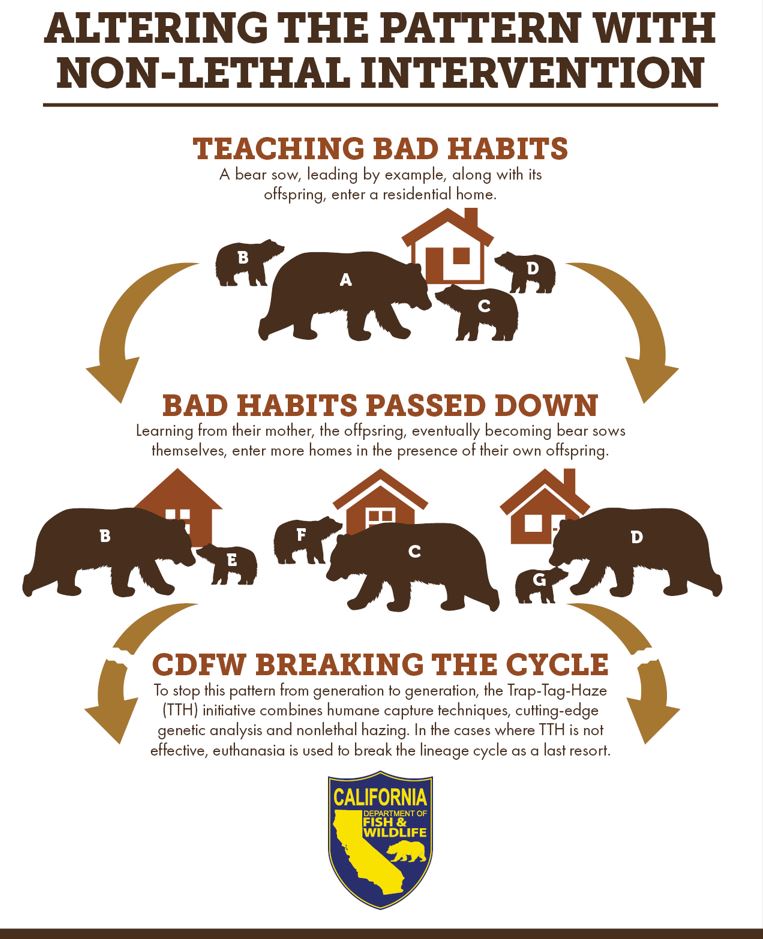The Challenge and the Response
Black bear conflicts have increased in the Lake Tahoe Basin in recent years, creating serious concerns for public safety and property damage. To meet this challenge, the California Department of Fish and Wildlife (CDFW) launched the Trap-Tag-Haze (TTH) program in 2020. This cutting-edge, science-based program combines humane capture methods, genetic analysis and nonlethal hazing to reduce conflict and improve coexistence.
By summer 2025, CDFW and its partners had trapped, tagged, hazed, and genetically documented more than 360 individual bears, and efforts continue across the basin.
How the Program Works
CDFW and cooperating agencies manage human–bear interactions through three coordinated phases:
- Trap: Biologists set ethical cage traps in conflict hot spots to humanely capture bears.
- Tag and Assess: While safely sedated, each bear receives a numbered ear tag and a full health evaluation. DNA samples (blood, hair and saliva) are also collected for profiling.
- Haze and Release: After the bear recovers from sedation, staff haze bears with noisemakers, paintballs or beanbag rounds to reinforce negative associations with developed areas and humans before releasing them into nearby suitable habitat.
This structured approach improves safety, ensures consistent hazing actions to intervene on negative behaviors, and creates long-term data that informs management decisions.
Genetic Insights and Conflict Behaviors
DNA analysis has transformed how CDFW manages bears in Lake Tahoe. Genetic profiling allows biologists to:
- Accurately identify individual bears.
- Avoid misidentification, which often occurs when relying only on appearance or sightings.
- Track how conflict behaviors are passed down through family lines.
Research shows that mothers often pass conflict behaviors to their offspring. Bears that repeatedly access human food sources frequently teach these behaviors to cubs, creating generational patterns of conflict behavior. When one bear teaches multiple offspring conflict behavior, increased conflicts occur across developed landscapes.
Case Studies: Family Lineages in the Tahoe Keys
Genetic evidence shows that conflict behaviors often pass through family lines when bears gain repeated access to human food and garbage. The family of Bear 182 provides a clear example of this pattern, with conflict behaviors extending across multiple generations.
Matriarch: Bear 182
- First linked to a public safety incident in 2020 in the Tahoe Keys.
- Trapped-tagged-hazed in 2022 along with three yearlings: Bears 180, 753, and 215.
- Continued home invasions, as a learning group, through 2023.
- Produced another cub, Bear 1975, in 2023.
- After another public safety incident in fall 2023, CDFW euthanized Bear 182.
First Litter (2021 Yearlings): Bears 180, 753, and 215
- Bear 180 – Detected in multiple home invasions by late 2022. Aggressive behavior escalated through 2023. CDFW euthanized the bear after repeated invasions and depredation requests.
- Bear 753 – Genetically linked to 12 home invasions since 2022, plus several visual identifications. Now raising a cub that has already been genetically detected inside homes, continuing the cycle of conflict.
- Bear 215 – Still active in South Lake Tahoe. Genetic detections confirm three home invasions as of July 2025.
Second Litter (2023 Cub): Bear 1975
- Detected genetically with Bear 182 (matriarch) in 2023.
- Collared and released after 182’s euthanasia.
- Continued to raid homes and caused safety issues, including incidents near a children’s camp in Kirkwood.
- Despite relocation attempts, Bear 1975 persisted in conflict behavior and was euthanized in 2024.
A Generational Pattern
Across three generations -- Bear 182, her multiple seasons of yearlings (180, 753, 215, 1975), and now 753’s cub -- CDFW has documented a consistent pattern of home invasions and conflict behaviors. Genetic analysis confirmed that these behaviors were not the work of a single “problem bear,” but rather a family lineage repeatedly engaging in the same actions. This evidence underscores the limits of visual identification and demonstrates the need for genetic data to guide accurate, science-based management decisions.
Reducing Attractants: Community Action
In addition to managing bears directly, CDFW invests in reducing human-related attractants. In 2022, CDFW secured $2 million from the California Legislature to expand bear-resistant garbage infrastructure in the Lake Tahoe Basin. Through local assistance grants, Placer and Alpine counties installed 395 residential bear-proof enclosures and four multi-family bear-proof dumpsters by June 2025.
The public can help prevent negative outcomes for black bears by always practicing good BearWise Basics. This includes removing attractants like trash, human and pet food, grills and smokers, and bird feeders in high bear-activity areas.
These efforts reduce food access, decrease habituated behaviors, and keep bears wild.
Why This Matters
The Trap-Tag-Haze program illustrates how CDFW applies science-based, proactive management to reduce conflict. Its key strengths include:
- Accurate identification through tagging and genetic profiling.
- Insights into family-level behavior patterns that inform long-term management.
- Targeted hazing builds negative associations with developed areas.
- Community investment in bear-proof infrastructure that limits attractants.
Effective coexistence requires both responsible human behavior and consistent wildlife management. By combining genetic science, active fieldwork, and community partnerships, CDFW advances a management model that prioritizes public safety, reduces property damage, and conserves wildlife.
 Graphic illustrating family relations in bear conflict activity.
Graphic illustrating family relations in bear conflict activity.